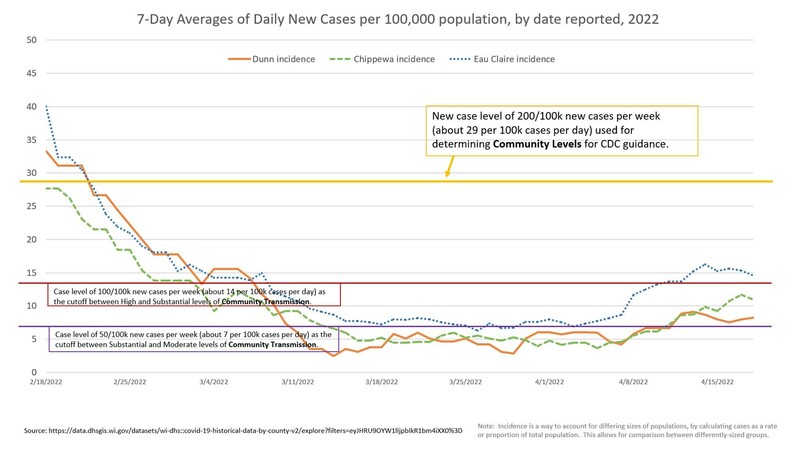We are seeing a slow, gradual increase in case rates in the Chippewa Valley. This is not a surprise, as BA.2 makes its move and most folks have stopped taking precautions such as masks and avoiding gatherings. We are still at the LOW Community Level, as cases are still not very high and our area hospitals are doing great. (They haven't had more than 10 COVID admissions per week since late February, hurray!) If you are a very COVID-cautious person, however, you may wish to be a bit more careful these days and dial up your protective measures somewhat, especially considering that reported cases are likely a small fraction of total new cases nowadays, due to milder symptoms with Omicron (overall, not for everyone though), home tests that aren't reported, and pandemic fatigue, which is leading many folks to simply not get tested. (If you don't get tested, you can't have COVID!, as they say.) Dunn and Chippewa counties are now at substantial transmission, and Eau Claire is at high, using the old metrics (which were created when the goal was zero COVID). WI DHS finally updated their illness after vaccination data, which is great, as it shows continued protection from severe illness and death. The data uses incidence rates per 100,000 so that we can compare. For example, in March, there were 2 deaths for every 100k vaccinated folks in WI and 6.4 deaths for every 100k unvaccinated. Thus, unvaccinated people died from COVID 3x as frequently as vaccinated people. That 3x is what we call relative risk - their risk is 3x higher relative to the vaccinated folks. If you look at the rates of hospitalization and death in vaccinated vs. unvaccinated folks, you can see the clear difference between them over time. Now, part of this difference is due to vaccine. But part of it is also likely due to differences in behaviors (masking vs. not and attending gatherings vs. not) as well as in prevalence within people's social circles. You can see that for most of the pandemic, the relative risks for unvaccinated were really high - they were MUCH more likely to get hospitalized or die. That relationship still holds true for recent months, BUT the size of it now seems smaller. Part of this is likely due to the fact that behaviors between the two groups are now more likely to be similar - most vaccinated folks are no longer masking and distancing. Part of it may also be due to the vaccine being relatively less effective against Omicron. Without a study where people are randomized to behave in certain standardized ways, we cannot fully know the extent of one factor vs. the other. Additionally, this data does not take into account whether the vaccinated folks were boosted or not (only about 50% of vaccinated people are), and we know that makes a huge difference in risk (in NYC data, the risk for vaccinated but not boosted falls about halfway between vaccinated w/ booster and unvaccinated).
So, the size of the benefit may be somewhat smaller than seen previously (perhaps due to confounding by behaviors and exposure risk), but vaccinated folks STILL have a SIGNIFICANTLY lower risk of hospitalization or death than unvaccinated folks, who are at a 200-500% increased risk.
Memberships
Alexandra Hall M.D. – Dr. Hall earned a Bachelor’s of Science in Science Education from New York University, taught high school in East Harlem, and then earned her M.D. from Mount Sinai School of Medicine.
She then completed a residency in Family Practice and served as Chief Resident at the University of Vermont. After practicing medicine for Dean Health System in Wisconsin and then at Cornell University in Ithaca, NY, Dr. Hall moved to Menomonie, WI to work at UW Stout, where she currently teaches for the Biology department and serves as a physician at Student Health Services.
Dr. Hall has a passion for educating people about health and science; she gives workshops regionally and nationally on various medical topics to both lay and professional audiences and has won several teaching awards for her work.



Add new comment